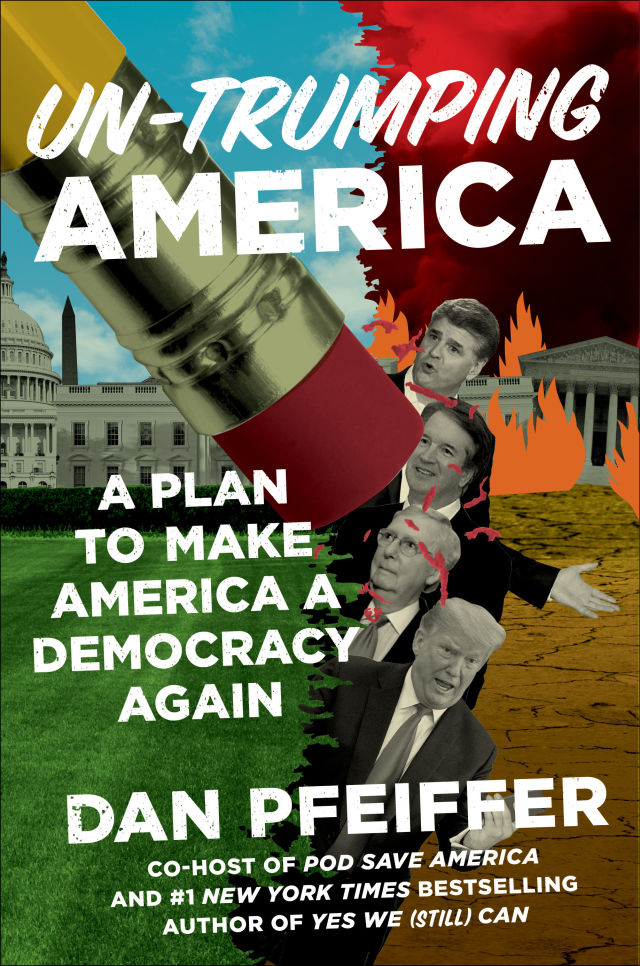Want to Know How to Get Rid of Trump? Dan Pfeiffer Has Some Ideas

Un-Trumping America: A Plan to Make America a Democracy Again
Image: Courtesy Hachette
If you’re a liberal in North America right now, getting rid of Number 45 likely features pretty high on your to-do list. That’s where the new book from Dan Pfeiffer—director of communications under Obama, former advisor to that president, and currently cohost of the progressive political podcast Pod Save America—comes in handy. Un-Trumping America: A Plan to Make America a Democracy Again sets out a clear blueprint not only for ridding the country of its current administration, but for ensuring we don’t end up in the same pickle again any time soon. Written, says Pfeiffer, for “Democratic voters, Democratic activists, and Democratic elected officials,” it’s a clear and accessible deep dive into everything from the true motivation of the Republican party under Mitch McConnell, through social media strategies, voter suppression, the electoral college, court and Senate reform, and other strategies to accomplish the above. And often it’s pretty funny too, which, given the subject matter, is no small achievement.
We spoke to Pfeiffer ahead of his Powell’s reading on Wednesday (February 26), for the TL;DR version of how to turf out Trump.
We’ve signed up to the notion that to win an election, you have to persuade the swing voters. So how do we do that?
[When we talk about] swing voters or we call them persuadable voters in campaign jargon, that automatically rises to this assumption that they are “centrist” or “moderate.” And I actually think voters are much less ideological. The voters in the “middle” are more skeptical of both parties. And you have to make a compelling argument to get them to vote your way. You don’t have to find that point that is equidistant between your positions and Donald Trump’s positions, because that will tilt the conversation right, and not accomplish what we want to do. And I don’t think it will win elections either.
You make the point though, that it’s not only swing voters who can turn this election.
Politics in America has been polarized for a very long time and we've always had two parties when there was a portion of the other party that is not reachable to us. That's not even getting into some sort of cult of Trump thing. It's just they fundamentally disagree with literally everything we stand for, so they're not available to us. There are two groups of people that we should be focusing on: one is the other independents or swing voters, whatever you call them, who have voted for Democrats in the past, maybe went for Trump in 2016. Those people are very reachable.
But the other group of swing voters that we never talk about are non-voters, right? Those are the people we should be reaching because non-voters often make that decision relatively consciously. Sometimes just because voting is too hard. But it's also because they have looked at it and decided that they didn't think their vote would matter. It didn't matter who would get elected. So how do we change that perception? By reaching out to them, offering a message that’s inspiring to them. And then once we get them to vote, delivering on the types of promises we made so that they understand that their vote mattered. Less than a third of the country is “the Republican base.” The rest of it is people that we have a shot at.
Is there a candidate that you can see in the current race for primary that, that you would say can do that, can bring out the voters and beat Trump?
There's no way to know. And even if we pick someone and then they lose, it's a counterfactual. We still may have picked the best person we had on the menu. How we think about how you win elections is so distorted by both the shock to the system of 2016 but also the fact that the narrative of the election and the mindset of politically engaged Democrats is it was white guys in Wisconsin who were probably sexist, maybe a little bit racist, who decided this election. Therefore, we're going to reverse engineer our decision based on that, which is how you end up with a primary where three of the leading contenders as of right now are a couple of white guys over 78 and one of them under 40 years old. I am just going to have faith in the idea that as flawed as our primary processes, the candidate who best navigates that process is probably our best bet to take on Trump. Because if you can't beat everyone else, you probably can't be Trump.
It feels like there’s been a lot of whipping around with firehoses the past four years, putting out the next conflagration—currently they're all pointed at the November ballot with a focus on ousting the incumbent. But your book makes clear that some longterm thinking might not be a bad idea.
The two fundamental ideas that led to me writing the book were: One, there's nothing more important than beating Trump. He is an existential threat to the country and the planet, but beating Trump is not enough because all the forces that created Trump will still be there the day after he leaves. The Republican party that enabled Trump will still be there the day after he leaves. And so if we're going to beat Trumpism, the underlying political philosophy that led to his rise, that's going to require taking on these big structural political changes that I outlined in the book.

Dan Pfeiffer
Image: Courtesy Hachette
Your book looks at how to effect change, with a focus on a number of areas: we need to register more voters, guard against gerrymandering, examine our court system, take down the electoral college, and more. Given the very real activism fatigue and general overwhelm, can you articulate one priority within all of that for those who can’t do it all?
I would focus on voting because ultimately the fastest, and the path of the least obstacles to changing politics in this country is by getting the 40 percent of voters who don't vote to vote. And we do that both by grassroots organizing, but also by making it easier to vote because we make it absurdly hard to vote in this country. So either through more early voting or same day registration or automatic voter registration, you can make it so a combination of changing the laws and stepping up our organizing to get everyone involved in the process would move the country in a progressive direction very quickly.
For those of us who can rarely get past a Twitter-length message these days, what’s the TL;DR of Un-Trumping America?
The TL;DR is if Democrats wanted to beat Trump and the Republican party—they enabled Trump—we have to make fixing our democracy a centerpiece of our platform. Everything flows from that.
Which is why a percentage of the proceeds from the book are going to Stacey Abrams new group to promote fair elections?
A portion the books in presale—which includes the books that are part of tickets for the events—go to Fair Fight which is Stacey Abrams’s group to protect voting rights. They're going to be fighting voter suppression in battleground states across the country and I think that's important.
Ultimately, Democrats seem to struggle with this notion that Republicans are playing dirty while being opposed to playing that same way. How can you win if the other side is cheating all the time?
We have to start acknowledging that they're cheating. Our response to their cheating has been to complain about it, appeal to the referees, and by the referees I generally mean people like the New York Times editorial board and hope for Republicans to change their behavior and that has not happened in, and that will not happen. So what we have to do is make it harder for them to cheat by reforming our political system, right? That starts by winning elections at the state level so you can deal with gerrymandering, passing laws, undoing some of that. We can undo a lot of their cheating on voting.
All the ideas I advocate here are things that I think are good for American democracy, and they are also good for the Democratic party. We Democrats have this advantage, which is there are more of us. And if we could just get all of us to vote and have the ability to participate in the political process we would win all the time. There were fewer Republicans—we don't actually need to cheat to win, we just need to stop the other side from cheating. And that's really one of the fundamental reasons why I wrote this book. We have to understand what they have done to our politics over time, not just since Trump got here, and have a plan to fix it.
Dan Pfeiffer
7:30p.m. Wed, Feb 26, Powell's City of Books, FREE




